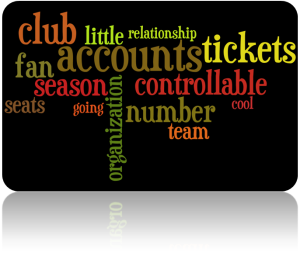 Typically, fewer than 6% of season ticket accounts are likely to reduce their number of seats year-to-year. That’s based on a history of our CSS fan research in the Sports Industry. So when we read stories like USU football: Aggies looking to increase season-ticket sales where the Athletic Director notes the main reason for recent drops in season tickets is a reduction in seats by individual accounts, it’s odd to hear. The AD states “that the school’s tracking system shows the Aggies haven’t lost as many season-ticket buyers as they have the number of tickets bought. Many fans are buying two or four season tickets this year instead of six or more in years past.”
Typically, fewer than 6% of season ticket accounts are likely to reduce their number of seats year-to-year. That’s based on a history of our CSS fan research in the Sports Industry. So when we read stories like USU football: Aggies looking to increase season-ticket sales where the Athletic Director notes the main reason for recent drops in season tickets is a reduction in seats by individual accounts, it’s odd to hear. The AD states “that the school’s tracking system shows the Aggies haven’t lost as many season-ticket buyers as they have the number of tickets bought. Many fans are buying two or four season tickets this year instead of six or more in years past.”
So what can cause a relatively unusual action – reducing the number of tickets – to occur? Among the factors not controllable by the club are the economy, the financial status of the accounts, families downsizing with kids going to college elsewhere, etc. But what are causes that the club can control?
What we’ve found is that when fans are keeping their accounts but reducing the number of tickets, this is a symptom of a wavering commitment to the team. The somewhat controllable factors are the following:
- Concerns with the “Direction of the Team” – Fan is uncertain about whether their investment is worth the lack of a plan (or a poor plan) for improving performance of the club. The fan is less likely to want to invest big on something that seems like it’s going in the wrong direction.
- Lack of Personal Connection – From a controllable perspective, there are no strong ties to account representatives that can communicate more 1-on-1 with accounts to allay concerns and strengthen ties. A strong relationship is not being built. Weakness drops commitment.
- Decreasing Pride in the Team – The organization is doing little in the community or little to overcome negative perceptions of players, coaches, and other personnel. It’s no longer the “cool thing” to be a fan of the team – it becomes more of the cool thing to bash the team or hide your fandom. The organization is doing little personally with the fan to overcome these perceptions.
Much of the decision of the account to decrease their annual season ticket purchases is out of the control of the “business side” of the club. But that can’t be an excuse for failure. Look for those aspects of the organization, the experience, and/or the people involved that are controllable.
Look for those attributes that decrease perceived value or create doubt about the future direction of and relationship with the club.
Find ways to keep the accounts from dropping seats.
Did you like this post? Here are other Sports-related posts:





















